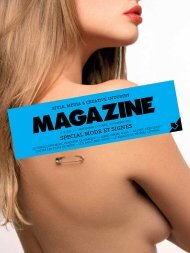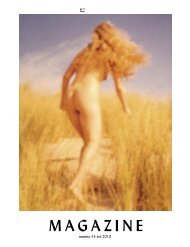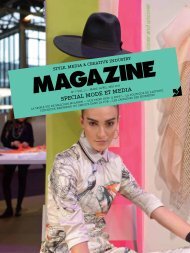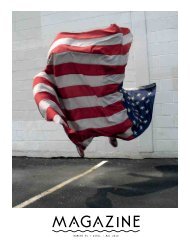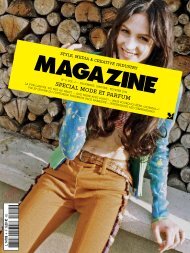iconiques - Magazine
iconiques - Magazine
iconiques - Magazine
Create successful ePaper yourself
Turn your PDF publications into a flip-book with our unique Google optimized e-Paper software.
MAGAZINES<br />
SHOPPINGHOUR<br />
Angleterre, 96 p., n° 8, 165 x 235 mm, 6 €<br />
shoppinghourmagazine.com<br />
On se demande parfois où s’évapore la théorie ingurgitée par tant d’étudiants en art,<br />
sciences humaines ou sciences tout court, comme si le réel en était régulièrement<br />
purgé. Mais il arrive que quelques avatars resurgissent où on ne les attendait pas ou<br />
plus. Shoppinghour magazine semble ainsi un égaré dans le panorama de la presse<br />
de style, mais il ne tarde pas à livrer la pertinence de sa démarche. “A magazine bringing<br />
art, philosophy, poetry and critical theory together in exposing the nuances of<br />
contemporary life and culture” : plus qu’une baseline, c’est un projet voire un manifeste.<br />
Si le présent numéro traite de la critique de la science, les précédents avaient<br />
pour thème les droits, le conflit ou encore le carnaval sans fin. Shoppinghour nous<br />
saisit par des réflexions comme : « le malentendu est que la science est considérée<br />
comme plus précise que la poésie », et d’enchaîner avec des expériences scientifiques,<br />
doublées de dessins, qui démontrent une imagination qu’on pensait rencontrer plus<br />
volontiers dans la poésie. Shoppinghour s’ingénie donc à tirer le tapis sous nos pieds,<br />
à faire vaciller les objets autour de nous et à interroger nos certitudes, en invitant le<br />
lecteur à regarder un postulat comme une fiction. Quelques plongées dans le cinéma<br />
ou la musique jouxtent des textes sur l’astronomie, la transparence ou encore le rapport<br />
des enfants au monde. Shoppinghour est très international : basé à Londres, ses<br />
contributeurs sont australiens, japonais ou grecs, et son design est réalisé par un<br />
studio italien baptisé Think Work Observe, encore une baseline !<br />
EXTRAIT<br />
NURTURED NATURE<br />
In childhood I longed to be an adult. I wanted to have the liberties of<br />
being a grownup which at that age I did not yet understand, or realize<br />
what the price of losing childhood would be. For me it was a promised<br />
land of childhood, a utopian end-point that would far-surpass the<br />
pleasures of youth. Now I see childhood as utopian; I pine to reconnect<br />
with my lost state of mind, to be unconditioned, unsocialised, uninfected<br />
by the viruses of culture and see the world with fresh eyes; to return<br />
to a place where anything can happen in a world of possibilities. As my<br />
childhood self becomes more and more like a stranger to me, I interpret<br />
adulthood in itself as a mourning process of childhood, where we reminisce<br />
our past selves that are us, yet different from us. I relish this era of<br />
unleashed creativity, where I thought outside the box because the box<br />
had yet to exist. All children are artists. The problem is how to remain an<br />
artist once he grows up. I consider open mindedness where every new<br />
experience is a surprise in contrast to adulthood indifference; where a<br />
dog is approached with the same curiosity as a duck billed platypus.<br />
An absence of banality and absurdity, in a world where normal doesn’t<br />
exist, un-yet tied down by logic. Children are un-yet confined by conventions<br />
of how we are supposed to behave and ways in which we are<br />
supposed to think. I remember my childhood sense of discovery where<br />
everything is hidden and waiting to be revealed. With an open childhood<br />
mind I was filled with curiosity and play with uncapped fantasies,<br />
whereas the movement into adulthood has closed the mind, and the<br />
norm is taken for granted. Perceptions become fixed. Be it innocence<br />
or ignorance children are free from the social norms, categories, binaries<br />
and other adulthood restraints. In this sense there is a oneness, a<br />
wholeness to the child’s unbounded thinking. There is little preoccupation<br />
with other people’s perceptions, and with little self-consciousness<br />
of the seriousness of others we are closest to our natural selves, un-yet<br />
suppressed by civilization. In early childhood our instincts un-yet restrained<br />
are free to express themselves. In open pursuit of the pleasure<br />
principle, there is curiosity around their undefined instincts.<br />
[…] Jonny Briggs, p. 22<br />
FOUNDING EDITORS :<br />
Peter Eramian<br />
& Yasushi Tanaka-Gutiez<br />
EDITORS :<br />
Mika Hayashi Ebbesen, Caleb Klaces,<br />
Dora Meade, Ania Micinska<br />
ART DIRECTION :<br />
Think Work Observe<br />
PUBLISHER :<br />
Shoppinghour<br />
MAGAZINE N O 8<br />
20


